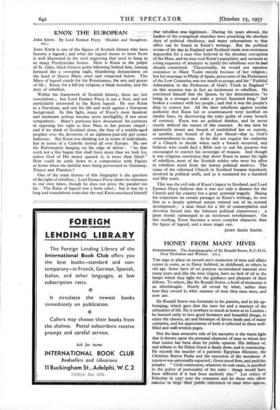- KNOX - THE EUROPEAN JOHN KNOX is one of the figures
of Scottish history who have become a legend ; and what the legend means to most Scots is well illustrated in the steel engraving that used to hang in so many Presbyterian homes. Here is Knox in the pulpit of St. Giles, black Geneva gown billowing behind him, leaning forward like a swooping eagle, thundering denunciation on the head of Queen Mary, erect and composed below. The Mary of legend stands for the Renaissance, the arts and graces of life ; Knox, for a kill-joy religion, a bleak morality, and the duty of rebellion.
Within the framework of Scottish history, these are just conceptions ; but Lord Eustace Percy is not a Scot, and not particularly interested in the Knox legend. He sees Knox as a European, and sets his life and work against a European background. In this light, many of Knox's most fanatical and intolerant actions become more intelligible, if not more sympathetic. Mary's partisans have denounced his pettiness in opposing her right to hear Mass in her private chapel ; and if we think of Scotland alone, the fury of a middle-aged prophet over the devotions of an eighteen-year-old girl seems ludicrous. But Knox was thinking not in terms of individuals, but in terms of a Catholic revival all over Europe. He saw the Reformation hanging on the edge of defeat : "he that seeth not a fire begun that shall burn more than we look for, unless God of His mercy quench it, is more than blind." How could he settle down to a compromise with Papists at home when the faithful were being persecuted in Germany, France and Flanders ?
One of the main themes of this biography is the question of the right of rebellion ; Lord Eustace Percy shows its relevance to our own times, though he does not press the parallel too far. The Knox of legend was a born rebel ; but it was by a long and roundabout route that the real Knox convinced himself
that rebellion was- legitimate. During his years abroad, the leaders of the evangelical churches were preaching the absolute duty of political obedience, and many exhortations to that effect can be found in Knox's writings. But the political events of his- day in England and Scotland made non-resistance impossible for a man who believed in the absolute corruption of the Mass, and we may read Knox's pamphlets and sermons as a long sequence of attempts to justify the rebellious acts he bad already committed. Theoretically, he would not sanction resistance to Mary Tudor merely because of her religion ; but her marriage to Philip of Spain, persecutor of the Protestants of the Low Countries, was too much to accept, and his "Faithful Admonition to the Professors of God's Truth in England" on this occasion was in fact an incitement to rebellion. He convinced himself that the Queen, by her determination "to bring in a stranger and make a proud Spaniard king," had broken a contract with her people ; and that it was the people's duty to correct her. All the later rebellions against secular authority that Knox led or countenanced were justified on similar lines, by discovering the ruler guilty of some breach of contract. Knox was no political thinker, and he never clearly defined the nature of this contract. At. one time he apparently meant any breach of established law or custom, at another, any breach of the Law Moral—that is, God's commandments to man. As he did not require the authority of a Church to decide when such a breach occurred, any believer who could find a Bible text to suit his purpose was encouraged to convict his sovereign of treason. And though it was religious conviction that drove Knox to assert his right of rebellion, most of the Scottish nobles who were his allies in rebellion acted from the lowest political motives. The cause of the reformed Chinch in Scotland became hopelessly involved in political strife, and so it remained for a hundred and fifty years.
This was the evil side of Knox's legacy to Scotland, and Lord Eustace Percy believes that it was not only a disaster for the Church and the country but a great personal tragedy. Basing his conjecture on certain passages in Knox's writings, he sees him as a. deeply spiritual nature twisted out of its normal development ; a man fitted for a life of contemplation and devotion forced into the bitterest political controversy ; a great mystic submerged in an intolerant revolutionary. On this reading, Knox becomes a more complex character than the figure of legend, and a more tragic one.
JANET ADAM SMITH.






















































 Previous page
Previous page